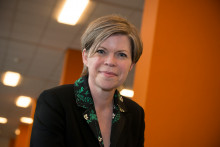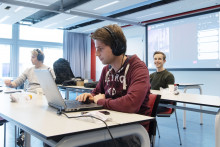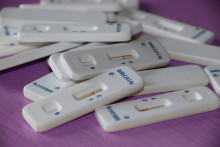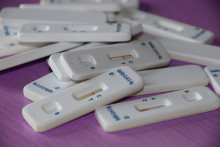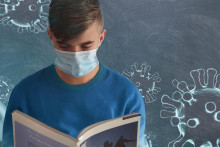Which moment has impressed you most in the past year?
Bult: ‘There are many. Take the moment when we were able to reopen after the first wave. I finally saw colleagues again 'in real life', with whom I had been in crisis meetings for many days. At those moments you just want to hug, you want to put your arm around someone. However, the social distancing still existed. That is very confronting. I also noticed it at the farewell of colleague Maurice Bouwens, who died last autumn. At times like that, you fall seriously short in interpersonal contact. The one-and-a-half metre society is far from ideal.’
Yet the university has been forced to change into a one-and-a-half metre university. Has that worked out?
‘I can definitely say ''yes'' to that. Despite the limitations, the UT was able to make the leap. In the first weeks after the outbreak, a lot of work was done. After the summer holidays, practically everything was ready for the new academic year. At the moment, there seem to be more easings on the horizon for higher education. From April onwards, students will be allowed to attend physical education for a maximum of one day a week. For the UT, this means a return to forty per cent education on campus. Employees will also be allowed to work forty per cent of their time on campus. We are returning to the situation before mid-December. But we'll have to wait and see how the situation develops in the coming weeks.’
What does the crisis mean financially for the UT?
‘The pandemic has not caused a huge dip in student numbers. There is even a slight growth. That gives a rather stable perspective for the financial situation. It remains uncertain what the crisis will mean for the commercial funding. It seems stable now, but the situation is fragile. Perhaps companies will cut back on their research and development in the future. The long-term consequences of the corona crisis remain uncertain.’
Is there enough compensation?
‘Additional resources have recently become available from the National Education Programme (Nationaal Programma Onderwijs, ed.). We will use these to compensate for the higher student numbers. We will also make extra funds available for the more vulnerable students. In addition, we can use the money to extend the contracts of young researchers who were delayed by the corona crisis.
‘At the request of the Dutch Minister of Education, Culture and Science, PWC carried out a study into the costing of higher education. Their report shows that scientific education and research in the Netherlands have an annual shortage of 1.1 billion. And this is referring to the situation before the pandemic. In other words, the universities delivered more quality than they were paid for. During the crisis, this inequality only grew. Luckily, the report provided some recognition for this problem. It is now up to politicians to ensure that more money is put into education on a structural basis.’
What lessons can be learned from one year of crisis?
‘There are many, many lessons. Let me give you an example. Our wellbeing surveys show that staff and students also saw the benefits of working from home. It provides relative autonomy, for example. People have got used to that and we want to retain those advantages for the future. I think that in the future, we must always look at the quality of activities. Where do activities perform best: online or on campus? The starting point is that we must retain the positive aspects of working from home.’
If you look back on the past year, what has been the greatest challenge?
‘Let me start by saying that the university has done amazingly well. Staff and students are showing enormous resilience. That is impressive. But the crisis has also taken a heavy toll on our organization. The workload at UT was already too high. We know that people asked even more of themselves during the crisis. They did so on the basis of their own professionalism. The question now is: will everyone be able to put it behind them? Or will there be lasting damage? As a Board member, you ask yourself: at what cost will this crisis be?’


